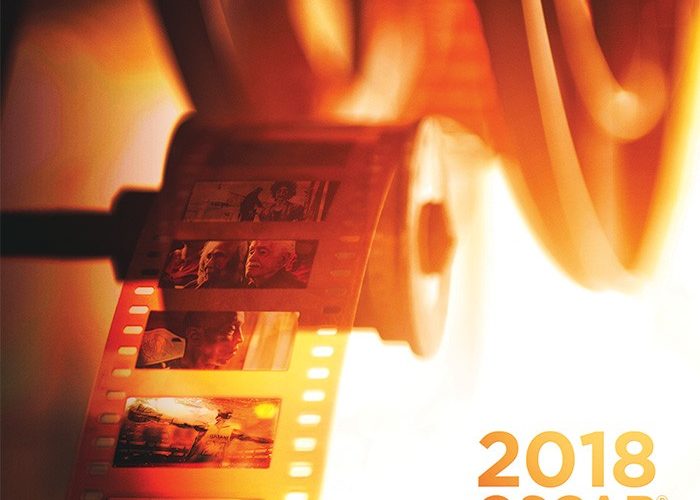Ahead of the Academy Awards, we’re reviewing each short category. See the Animation section below and the other shorts sections here.
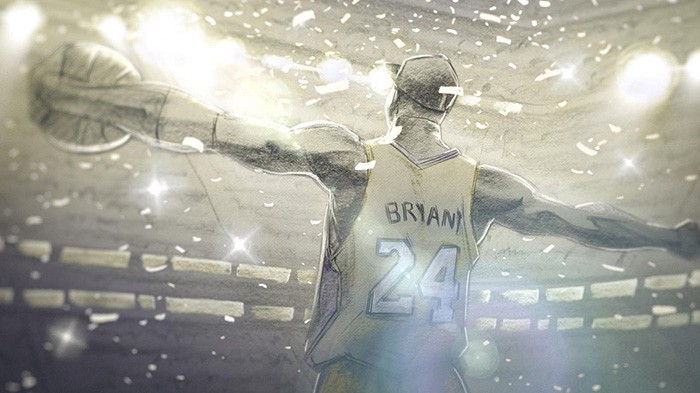
Dear Basketball – USA – 5 minutes
“Money” is a word used to describe Kobe Bryant the athlete because he was the guy you gave the ball to with no time on the clock. Everyone could rely on him whether coach, teammate, or fan because we knew the chances were that a good look at the hoop would result in a basket. He was “money.” As a result of the career that proved this point, Kobe accrued a lot of money in the literal sense of the word too. And with that money he discovered he could create a production studio (Kobe Studios), hire director/animator Glen Keane and composer John Williams, and bring to life a poem he wrote to announce his retirement. He made something heartfelt for the fans into something all about himself.
I’ll admit that the original poem Dear Basketball contains a powerful message about living a dream and inspiring others to follow in those footsteps. It was the type of candid soliloquy that has made Derek Jeter’s inspired platform The Players’ Tribune such an effective way to hear from athletes without a journalistic second-hand filter. But he wrote it November 29, 2015 and played his last game on April 13, 2016. He closed that chapter with affecting prose that surely gained him a lot of respect from many people despite a checkered past marred by controversy off the court. It was a high-note despite the season itself being a low. It shared his love for a game that has meant something so pure to so many for decades.
Deciding to bring it to life visually should have one motivation: the game. There are great moments here where the young Kobe throwing a rolled up sock is superimposed over the adult Kobe shooting with thousands in the stands and it all looks gorgeous with Keane’s loose yet contained pencil-work. But it’s also all Kobe. While this would be okay if someone else made it as a tribute, it feels overwhelmingly self-serving to see the first credit as “created and narrated by Kobe Bryant.” Not written, but created. This is a vanity project for a guy who doesn’t need the vanity anymore. The poem resonates because of its universal message. So make it non-descript. Make it about a boy becoming a man, not Kobe becoming Kobe.
Maybe this is my bias towards a millionaire using his resources, talents, and creativity to erect a shrine in his own image, but I cannot in good conscience appreciate something that comes off so manufactured. As a work of animation it is stellar and does deserve its Oscar nomination on a purely aesthetic level. But how can you look past the ego? It’s one thing to commission something about you that’s also for you and another to actively create it yourself. It’s almost as though Bryant looked back at his poem and realized how anonymous it was and missed the point that its anonymity was what made it a genuine classic. Kobe repurposed this piece that spoke from his soul into one whose voice now speaks from pride.
C+

Garden Party – France – 7 minutes
Just when we think a large amphibian covered in caviar and salivating at a glass jar of cookies inside a deserted mansion will be the most memorable shot of Garden Party — a French short directed by committee (Florian Babikian, Vincent Bayoux, Victor Caire, Théophile Dufresne, Gabriel Grapperon, and Lucas Navarro) — the sextet leaves us with an image we’ll never forget. The clues are there considering conditions are anything but sanitary with rotten food and flies buzzing everywhere, but even a few glimpses at bullet holes in the windows can’t quite distract us from the action in the foreground of toads gallivanting wherever their impulses demand. We become engrossed by what these creatures are doing within this environment that we’re distracted from realizing the environment is the focal point.
This bait and switch is expertly handled with physical comedy and an unavoidable cute factor thanks to a spry young frog leaping inside and out in search of butterflies and companionship. We revel in the impeccable animation (I would believe the artists if they said the whole was live-action) and enjoy the odd juxtaposition of amphibious material wealth, embracing the notion that these oft-ignored beasts are finally getting their day of unfettered luxury and excess. And as the music diverts our attention to the background in key moments, we start to pull away and take stock in the bigger picture despite remaining completely unprepared for the climactic reveal yet to come. It’s an attractively dark and surreal picture of one’s demise leading to an ecosystem’s delight.
A-
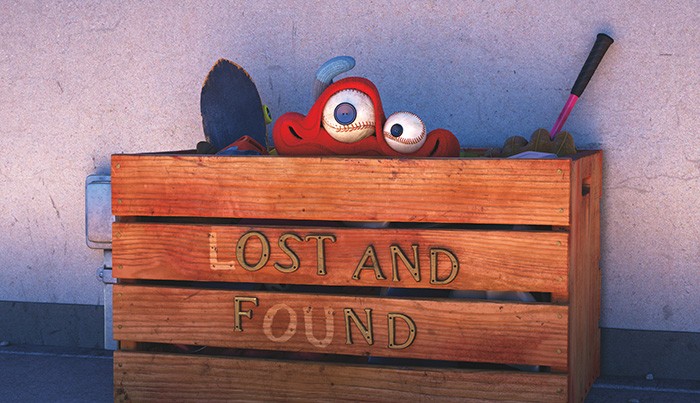
LOU – USA – 7 minutes
The latest Pixar short from longtime animator, first-time writer/director Dave Mullins is quite the deceiving little gem. LOU — a play on the missing letters from an aging school playground’s “Lost and fOUnd” box — starts out as an irreverent yarn wherein a baseball-eyed “creature” made up of discarded items with a hoodie for a body watches the children as they play before running out to collect abandoned toys when recess is over. We laugh at the fantastical situation, at this character that could easily turn into something of nightmares if not handled in the way it is onscreen. But this is just our introduction to the film’s contained environment. Soon we discover “LOU” as more than a lark. He’s really a keenly drawn educator on the issues of bullying.
That’s not to say there isn’t also a lesson in responsibility for property either. How many times have you left something out and lost it? Heck, I still forget where I leave my phone and glasses. “LOU” picks up after the children to not only ensure he is available to watch everything until they can be re-collected, but also to keep everything in one place for all to enjoy. He gets the kids’ attention upon their return with quizzical looks as far as where the toys they had have gone. A stranger didn’t take them, though — they’re safe and sound to be shared. It’s a utopian situation of adolescent joy until a bully arrives to steal what he likes from out of their hands (in admittedly funny ways).
He intercepts a football and wrestles away an electronic game. He terrorizes these children as “LOU” watches from his safe haven so as not to give away his secret existence. Except it’s too much to bear. He must slither and bounce over to take back what the bully has stolen. A wild ride of cat and mouse commences with an abundance of physical comedy and expert physics as “LOU” falls apart and reforms in multiple variations. And then we discover what is generally the case with bullies: they bully because they were bullied. A shot to the heart of emotion arrives as clarity is revealed and penance is performed. The result is a cutely poignant and important morality tale children everywhere will be better for having learned.
B+
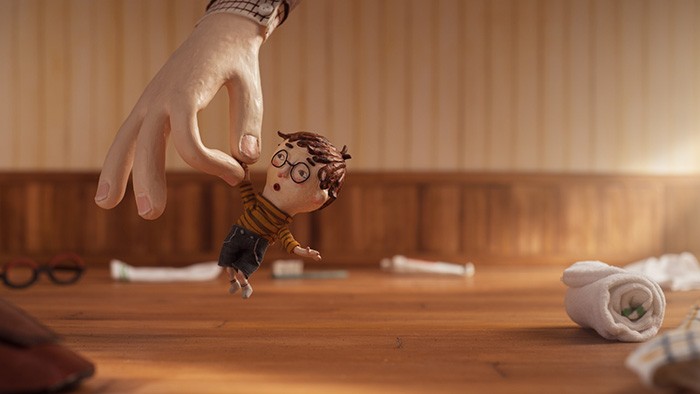
Negative Space – France – 6 minutes
We all hold onto a specific memory of someone close upon his/her death — a moment or moments special to us despite being uneventful to everyone else. Our relationship with the person defines what it is subconsciously. It could be a song, a movie, a vacation spent together, or perhaps even one spent apart. It can be a mutual hobby or sports team, exciting or mundane, but always unforgettable. To remember is to conjure a smile at its simplicity and its personal impact regardless of any overarching relevance to what came before or comes after. The best examples are those steeped in the everyday because they bring an image of that loved one now gone back from the dead to prove how they’re never too far away.
Directors Ru Kuwahata and Max Porter (otherwise known as Tiny Inventions) visualize this concept in Negative Space, their adaptation of a Ron Koertge poem. The story focuses on an adult male who narrates the context behind the “moment” he shares with his father. His ordinary process-based connection arrives from gazing at an open suitcase packed to perfection — a skill his dad taught him when he was a boy. We learn how the expert precision with which to fill that finite space became akin to the words “I love you,” the task itself a way to feel as though they were always together even when the act itself ensured they weren’t. The suitcase therefore signifies their bond. To have one is to take a piece of the other along.
Their style has a crude yet endearing stop-motion aesthetic; their sense of scale embellished to drive home ideas such visual eccentricity can in lieu of words. They turn a suitcase into the very world in which their characters live, cars unzipping zippers to open a memory while a little boy is swept away by a growing tide of unfolded clothing awaiting their place within the puzzle of life. And it all works towards an end that’s as profound as it appears trite — a deadpan joke with the weight of love turning it into a message of heartfelt admiration. A somber tone is found in the film’s steady delivery of exposition without emotion, the wound too fresh to acknowledge the truth and the memory pure enough to render that truth obsolete.
B
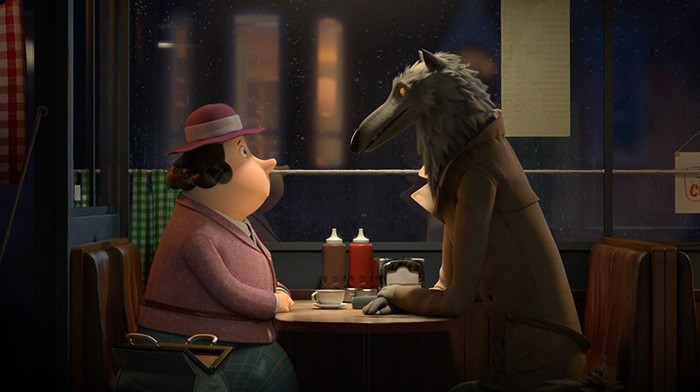
Revolting Rhymes – UK – 29 minutes
Have you ever listened to a fairy tale and lamented the poor villains simply trying to survive? You hear “Little Red Riding Hood” and think about how the wolf is operating by instinct. He sees a potential meal and using cunning ingenuity does all he can to acquire it. When you really step back and look at the story objectively, he’s doing what we all would in his situation. But because we’re human, it’s assumed we will align ourselves with the human and deem her heroic. She survives, helps avenge her grandmother, and does her part to make the woods a little safer with one less predator lurking in the shadows. We hope she grows old and starts a family, forgetting those loved ones the wolf leaves behind.
Well, Roald Dahl and illustrator Quentin Blake refused to forget. They put a different spin on traditional yarns from our childhood back in 1982, allowing for surprise endings where those getting their just deserts aren’t always the ones we remember. And now Jan Lachauer and Jakob Schuh have brought their Revolting Rhymes to life via two half-hour shorts that compile the six remixes into one hybrid parable narrated by a Big Bad Wolf (Dominic West). While the two were constructed and released in the UK together in 2016, however, the Academy of Motion Picture Arts and Sciences deemed the first part self-contained and successful enough to stand alone as an Oscar nominee. I would whole-heartedly agree since its wickedly delightful open-ended finale is the perfect unorthodox capper.
The gist: all those folk tales we think we know are wrong. The book Miss Hunt (Tamsin Greig) has in her possession while passing time before her evening babysitter job therefore catches the eye of a friendly wolf passing by. He scoffs at its characters’ glowing appearances — an anger rising from within due to so many details being wrong. Miss Hunt is confused considering she knows each to be fictional, so the wolf must set the record straight and explain how the “heroes” of those stories are actually the villains. He has two dead nephews (Rex and Rolf) to prove his point and thus commences his account of the incidents long ago that centered upon two young best friends named Red (Rose Leslie) and Snow White (Gemma Chan).
The result isn’t like Shrek because it still adheres to the stories themselves. These familiar characters aren’t simply co-existing within a single world removed from their historical significance. Still beholden to those trajectories, the circumstances of their lives are merely altered slightly so they may be woven together within a more realistic universe such as ours. For example: one of the “Three Little Pigs” is a banker loaning money to the others to build their faulty homes. The wolf terrorizing those three swine and the one who eats Red’s grandma are brothers. And Snow White’s “dwarves” are actually seven retired jockeys with a bad gambling addiction. With a pistol and some twisted vigilante revenge, those saccharine morality lessons that have become universally known are suddenly new again.
B+
The Oscar Nominated Shorts are in limited theatrical release starting February 9th. See the official site for more details and our reviews of the other shorts sections here.

